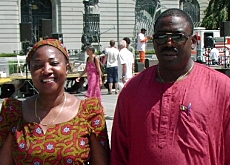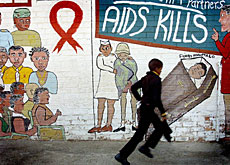Africans overcome homesickness

A large number of African immigrants arrived in Switzerland as asylum seekers, but now play an important part in the Swiss economy.
There are an estimated 65,000 people of African origin in the country, and despite their economic value, many still face discrimination.
“What have the Swiss gained from contact with Africans? A smile! And they have certainly learned to adopt a more relaxed attitude – which for us Africans is quite normal.”
This is how Armando Okito, an Angolan and the deputy chairman of the Forum for the Integration of Migrants, summarises the African community’s contribution to life in Switzerland.
Many members of Switzerland’s 65,000-strong African population are asylum seekers.
“Most Africans have come to Switzerland in the past 20 years, driven by the serious conflicts that have broken out in Africa and assisted by the development of mass transportation,” said Joëlle Moret, from the Swiss Forum for Migration and Population Studies (SFM).
Unity in diversity
Africans living in Switzerland come from all over the continent, speak different languages and are of different religions. But Okito says that this does not mean that the community is fragmented.
“We are united in our diversity,” said Okito. “Of course, there are geographical and linguistic affinities, which means that some ethnic groups have a greater sense of unity than others.”
There are many African associations in Switzerland which organise activities to strengthen ties between different communities and exchange information on what is happening back home.
They also put on events aimed at showing the Swiss aspects of African culture, music and cuisine.
But despite this, negative perceptions of Africans are rife in Switzerland, influenced largely by the fact that offences committed by a minority – which can include alleged drug dealing and violence – tend to rub off on the whole community.
Black African immigrants are often regarded with suspicion and are sometimes subject to discrimination, says the community.
French-speaking Switzerland
According to a recent survey, many felt that the level of acceptance by the local population largely depended on the language region of residence.
Africans in French-speaking Switzerland felt more at ease and accepted as part of a multicultural society. This was mainly because they shared a language with the host community and were closer to France.
But in German-speaking areas, the immigrants surveyed said they did not feel accepted and were often regarded with mistrust, even if they had lived and worked in Switzerland for a long time.
This view is backed up by Okito. “The African community in German-speaking Switzerland has made great efforts to win acceptance, but often feel they are not welcomed,” he explained.
“On the contrary, new obstacles are always being put in the way of their being accepted.”
He says that one of the reasons for this is the “rather reserved” nature of German-speaking Swiss. But he says that working groups can help to improve Africans’ image.
Contribution
In addition, many Africans are making a tangible contribution to the Swiss economy, says Okito.
“Africans often take on jobs which Swiss citizens find unattractive, and therefore meet a real need.”
This is proved by the fact that many Africans earn very modest incomes in Switzerland, he added.
The SFM’s Moret agrees. She said that many Africans only have restricted access to the labour market because they are asylum seekers.
“Those given leave to remain work mainly in the construction and catering sectors and – especially in the case of women – as cleaners,” said Moret.
“This situation arises from the type of work permit they are granted and from their lack of academic and professional qualifications, which, in any case, are often not recognised.”
Moret says there is no evidence of a brain drain from Africa to Switzerland. There are a fair number of African students at Swiss universities, but most want to acquire knowledge which they can take back to their home countries, she said.
Even if they wanted to stay, access to certain professions in Switzerland and other European countries is still severely restricted, added Moret.
swissinfo, Andrea Clementi
According to the Federal Statistics Office, there are approximately 65,000 Africans resident in Switzerland.
Of these, 20,000 are from North Africa.
16,000 from Central Africa.
15,000 from East Africa.
12,000 from West Africa.
1,500 from southern Africa.
Countries represented by large groups of immigrants include: Morocco, Algeria, Tunisia, Somalia, Angola and Nigeria.
A survey published in January 2005 found that many Africans suffer acts of racism and discrimination on a daily basis.
According to statistics issued at the end of 2003, three out of ten Africans in Switzerland are asylum seekers.

In compliance with the JTI standards
More: SWI swissinfo.ch certified by the Journalism Trust Initiative


You can find an overview of ongoing debates with our journalists here . Please join us!
If you want to start a conversation about a topic raised in this article or want to report factual errors, email us at english@swissinfo.ch.